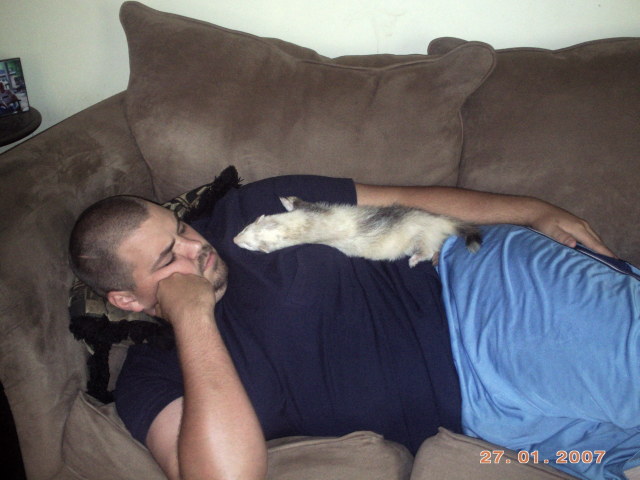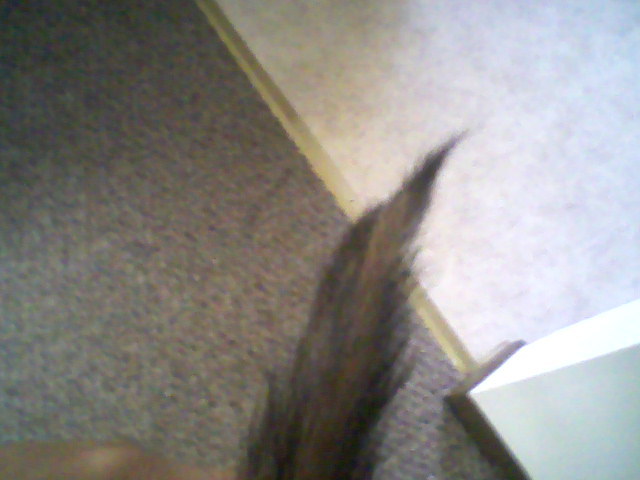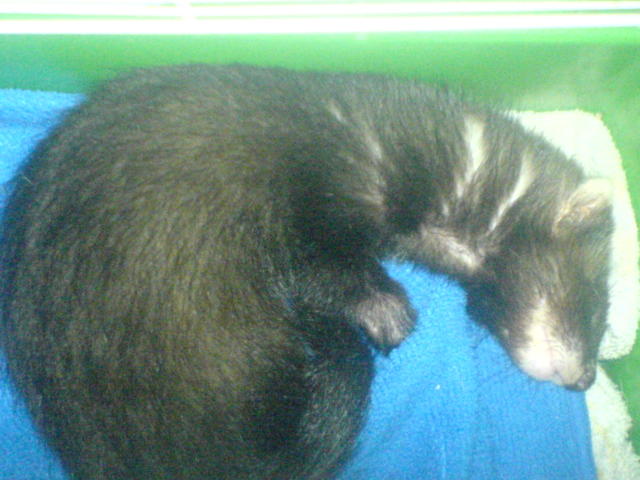QuestionCindy,
I stumbled upon your name while searching possible explanations for my ferret's recent illness. Note: we have been to the vet and she has received proper medical attention! However, my vet is between to likely causes: a bacterial infection or lymphosarcoma and I wanted to try and get your opinion on the matter. When I woke up Wednesday morning, Stella, my two year old little girl was acting very strange. She was very, very tired, which is not typical for her, she could barely open her eyes and when I set her on the floor she wobbled around like a drunk person because her hind legs had no strength. She had small tremors, no appetite and when she would open her eyes they looked glazed over, as if she was staring at something. I took her to the vet that day - they gave her fluids, checked her blood sugar and ran a complete blood count. The fluids perked her up a bit, her blood sugar was normal but her white blood cell count was low. On Thursday diarrhea started and then Friday we started her on Amoxi-drops, in hopes of fighting some kind of bacterial infection. In her physical we found that she has lost 4-5 ounces over the last few months (although she never showed a lack of appetite until this week) - she only weighed two pounds to begin with though, so I feel like she is wasting away. The vet also found no signs of tumors, or enlarged organs but said it still could be lymphoma and the tumors just haven't developed. Because she wasn't eating or drinking I am feeding her 12 cc of A/D wet food mixed with some water in a syringe every couple of hours along with 6 cc of water. When she eats and drinks she seems to pep up a little but she tires quickly and crawls back into her blankets and sleeps.
I trust my vet very much, she is wonderful and very knowledgeable on ferrets, but I am so worried and wanting badly to believe it's not cancer. Any ideas or thoughts? Sorry this is so long...just in need of another opinion.
Thanks so much,
Caitlin (worried ferret mommy)
AnswerHello Caitlin,
My apologies I could not respond sooner. My computer was out for repair. Has she had any improvement?
I will try to discuss both lymphoma and bacterial infections, since your vet needs to do more tests to try to determine exactly hat is causing the symptoms and how to treat it.
lymphosarcoma is commonly seen in ferrets, although they usually tend to be a bit older. The low lymphocyte count can be due to either the bone marrow's lack of producing new white blood cells or they are being used up by an infection. Further tests need to be done to differentiate between an infection and a lymphosarcoma since they can look identical. Often animals with lymphoma have increased white blood cell counts, but occasionally the opposite can be seen.
Does she have any enlarged lymph nodes? Although this is not always seen in all ferrets with lymphosarcoma, if she has several palpable nodes, this is the most likely diagnosis. A good way to help diagnose this is to have the vet aspirate or biopsy a lymph node and look for neoplastic cells although it is not always 100% diagnostic. Aspirates are much more difficult to read.
There are also two types of lymphoma in ferrets. It sounds like the "classic" type to me, since you did not mention any difficulty breathing.
Taken from http://www.ferretcentral.org/faq/med/lymph.html
"The "classic" form of lymphosarcoma, which causes marked enlargement of the peripheral nodes, is seen in older animals and has the more prolonged course of the two syndromes. In this disease, an infiltrate of small mature lymphocytes expands the peripheral and mesenteric nodes, eventually effacing nodal architecture. Late in the course of disease, neoplastic lymphocytes infiltrate visceral organs (including the liver, kidney, lungs, and spleen) resulting in organ failure and death. This disease is usually insidious, resulting in little clinical debility until extensive infiltration of visceral organs has occurred.
The lymphoblastic form [also called juvenile lymphosarcoma ], which affects ferrets from one to two years, is quite different. In this disease, large immature lymphocytes quickly infiltrate the viscera, including the thymus, spleen, liver, and many other organs. Little to no lymph node replacement is seen in these cases, a finding which results in a high rate of misdiagnosis by clinicians without extensive ferret experience. This form can take a myriad of clinical appearances depending on which organs are involved. One of the more common presentations results in dyspnea and is often diagnosed as cardiomyopathy or pneumonia. The lesion in this syndrome is actually a rapidly growing thymic mass which compresses the lungs. Less commonly, extensive hepatic infiltration by neoplastic lymphocytes may result in marked hepatic enzyme increases and icterus suggesting fulminant liver disease, and so on. Lymphoblastic lymphosarcoma should always be ruled out when dealing with any serious illness in young ferrets.
Lymphosarcoma in many cases is not an easy diagnosis. Definitive diagnosis requires interpretation of a lymph node aspirate or biopsy. While the presence of a monomorphic population of immature lymphocytes on a lymph node aspirate is highly suggestive of this disease, the opinion of a pathologist with ferret experience should be sought in all cases. Alternatively, a diagnosis may be made on biopsies of visceral organs in animals with disseminated disease, with the spleen probably yielding the highest number of positive aspirates or biopsies.
Over the last few years, a disturbing trend in diagnosis of this disease has been emerging - the interpretation of elevated lymphocyte counts as evidence of lymphosarcoma in the ferret. While many cases of lymphosarcoma may exhibit a lymphocytosis (high white blood cell counts) on the CBC, similar changes in the differential may be seen in any number of chronic smoldering infections, most notably gastric Helicobacter mustelae infection. The prudent practitioner requires a diagnosis by aspirate or surgical biopsy before any treatment is started.
There is about a 75% success rate with chemotherapy with life being prolonged for 6 months to 3 years post treatment. Most ferrets tolerate the therapy very well and have few side effects. Even those cases that are not good chemotherapy candidates, can be helped to continue a quality life with the use of steroids. "
Bacterial infections:
Info from http://www.ferretcentral.org/faq/med/ulcers.html
Helicobacter mustelae is extremely widespread in the pet ferret population. Several studies using random source ferrets have shown that almost every ferret carries this bacterium. As the bacterium is passed by a fecal-oral route, kits generally are infected by the mother within the first two weeks of life. Just like human helicobacter, ferrets can get serious gastric ulcers and die from it. Symptoms include:
Vomiting
Lack of appetite
Depression
Loss of weight
Grinding teeth
Dark, tarry stools
The treatment for this should be Amoxicillin, metronidazole (Flagyl), and Pepto-Bismol. This "triple therapy" has been shown to be effective in man, and to a large part effective in ferrets.
If there is no improvement you have seen on amoxi alone, she needs more tests to determine if her symptoms are from lymphoma or from a bacterial infection. I also recommend to try the triple treatment if the cause is still unknown since Helicobacter is the most common infection in ferrets and amoxi will not be sufficient alone.
-Cindy P.

 I think my ferret is to thin?
Question
Photo of Ferret
Hi
I think my ferret is to th
I think my ferret is to thin?
Question
Photo of Ferret
Hi
I think my ferret is to th
 Crazy Ferret
Question
Tweedle and Drew
My son brought home a ferret
Crazy Ferret
Question
Tweedle and Drew
My son brought home a ferret
 balding tail
QuestionQUESTION: The ferret I am talking about is one
balding tail
QuestionQUESTION: The ferret I am talking about is one
 ferret breeds and behaviour
Question
Oscar
hey, i got an 11 week old hob called Osc
ferret breeds and behaviour
Question
Oscar
hey, i got an 11 week old hob called Osc
 How do you think Isis is?
QuestionCookie and Isis :)
QUESTION: Hello. :)
How do you think Isis is?
QuestionCookie and Isis :)
QUESTION: Hello. :)